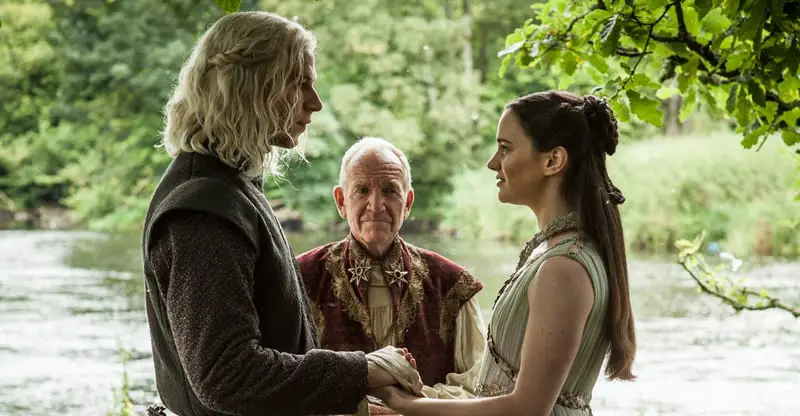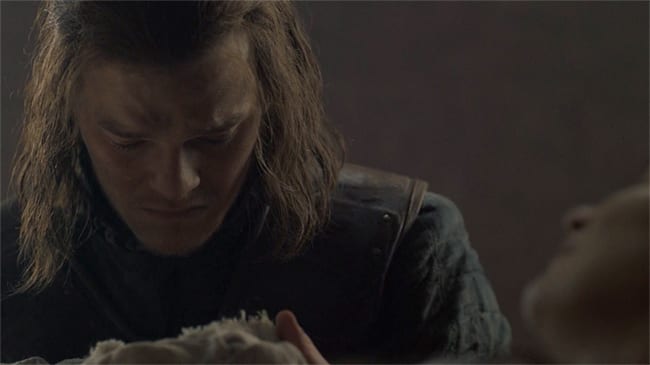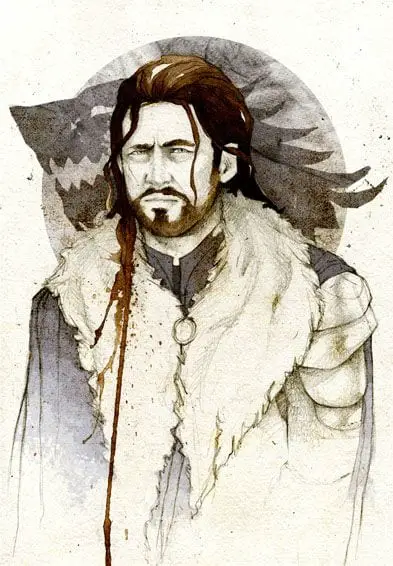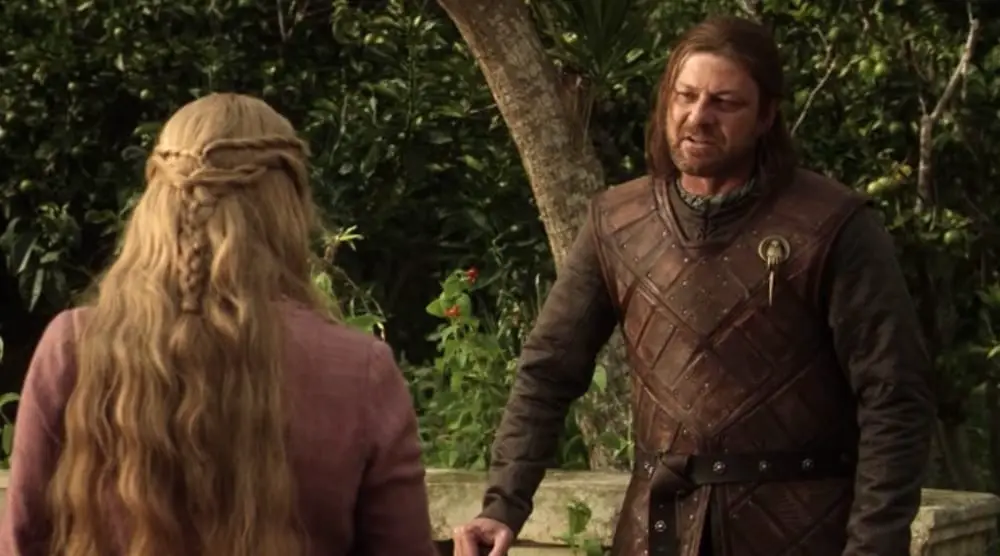Game of Thrones has been off our screens for almost two months, and despite running a blog dedicated to the show’s idiocy, I’ve found myself barely able to recall the events of Season 7. “Oh yeah,” I say, pausing to scrape wet food out of a can for Trystane, “Jaime and the Lannisters took Highgarden in an off-screen fight and poisoned Olenna.”
Really, everything leading to the culmination of the season sounds like some kind of incoherent fever dream: there was like, this mission to capture a wight…I think to convince Cersei of something? A truce! And Tormund and Beric and Jorah and Jon and Thoros were there? Gendry too. He had to run really fast!
Though Julia and I have not begun our rewatch of the season yet, I have a hunch we’re going to come to the conclusion that once again, showrunners Benioff and Weiss (D&D) wrote backwards from a bunch of cool moments or shocks. However, it still boggles my mind that they truly believed one of those beautiful, heart-pounding, breath-taking, live changing moments for Season 7 was the “reveal” of Rhaegar and Lyanna’s wedding intercut with sex in the most unearned romance possible. The reason it boggles my mind is two-fold: one, because we already found out Jon’s parentage last year. And secondly, no aspect of this was ever meant to be a reveal.

Okay, to the first charge, I know that we found out Rhaegar and Lyanna were earnestly in love, rather than Lyanna having been kidnapped against her will and raped, as we’ve heard it described by characters within the show.
Littlefinger: How many tens of thousands had to die because Rhaegar chose your aunt?
Sansa: Yes, he chose her. And then he kidnapped her and raped her.
Which, ignoring power dynamics and rather large age differences…okay? I’m chuffed to bits that the clarification about the brutalization of a woman we know literally nothing about and who has been on our screen a grand total of three times is considered so weighty. But forgive me if the framing and importance of the matter seemed to be more about Jon and Dany.
Oh, was it that the wedding proves Jon is the “rightful heir of Westeros” despite us spending three seasons with a Dany who wants to “break the wheel,” and two seasons with the most incomprehensible succession possible? Those intense Watsonian issues aside, that actually might be why D&D wrote to that flashback sequence, especially given Bran’s heavy-handed exposition over top of it.
“[Jon’s] never been a bastard. He’s the heir to the Iron Throne. He needs to know.”
Bran needs to know that the Targaryens were deposed by Robert, though of course, another part of this sequence was about how Robert’s Rebellion was “built on a lie.” I’m quite certain Aerys still violated the social contract expected of a king to his vassals, and that Rickard and Brandon Stark being roasted alive was no lie, but hey…had they just known Rhaegar and Lyanna were in love I guess there was a diplomatic solution in there somehow.
Look, my main point is that this “game changer” isn’t much of one at all. Jon could absolutely end up on the Iron Throne in this series. But it’s not as though Bran will explain this and suddenly everyone vying for the throne in some way will toss up their hands and agree it’s clear who’s meant to rule them. Nor do I see this thrilling the free and independent Northern Lords, unless of course Lyanna Mormont randomly tosses in her approval.
So we’re left with the fact that this ~amazing~ piece of information about Jon took two terrible flashback sequences in two season finales to fully explain, and yet it’s basically just a factoid that Bran thinks is cool. We haven’t even seen Jon react to it, and there’s really no indication why this would be so important to everyone in the story that it would render all current politics moot. It could at least compel Jon to act a certain way, or perhaps to get the Northern Lords to push for something, but the way we learned about it was contextualized by officially nothing. Hell, last year we didn’t even get Bran’s reaction!

In other words, it’s a reveal for the sake of the audience. But…why? So we can get excited about Jon’s legal viability? So we too can plan our own riverside wedding?
The thing is, I’m being rather negative about an aspect of the story that I’m quite fond of in the books. Yes, I speak of “R+L=J,” and everything surrounding this story. There’s a “mystery” aspect to it, in that the characters on our page are unaware. And yeah, Jon’s true parentage could be used in a way that might alter the politics, plus I’m assuming Jon himself will have a lot to think about the matter. However, the best part of it is that there’s no mystery at all. R+L=J is baldly on-page in the first book, and upon reread it makes everything click into place. Click how? By making sense of Ned’s arc, the person for whom this story really mattered.
I don’t want to sound condescending; I didn’t “figure out” Jon’s parentage on my first readthrough. It’s sort of in the realm of subtext, and if you’re not reading closely or really thinking through the emotional state of Ned, it’s very easy to miss. I’d peg it as being about as obvious as Dumbledore’s love for Grindelwald. Once I began engaging with A Song of Ice and Fire (ASOIAF) online, it was impossible to escape the R+L=J dialogue, so who knows if I even would have had it all click on a second read.
It doesn’t really matter. I suppose for some there might be bragging rights, just like for those who see both the duck and the rabbit on first glance. But what’s important is that it’s impossible to look at the image the same way after it’s mentioned, and it’s that whole image that characterizes Ned Stark.

See, Ned’s arc is perhaps one of Martin’s most “literary.” It’s about his struggle to balance internal vs. external honor as he navigates a particularly difficult political situation and is haunted by some of the similarities to the past. Yes, he tries to do the right thing and ends up with his head on a spike. But knowing about his sister’s death, the choices she made, and the lies he told to protect her, his actions come from an entirely sympathetic place.
Without the scaffolding of R+L=J…he just kind of seems like this stoopid who’s so committed to honor that it gets him killed.
Hell, Jon was the only sore point in his marriage, and yet he went to great lengths to protect him, raise him as his own, and never leave a space for him to be questioned. Why might that be?
“Ned did not feign surprise; Robert’s hatred of the Targaryens was a madness in him. He remembered the angry words they had exchanged when Tywin Lannister had presented Robert with the corpses of Rhaegar’s wife and children as a token of fealty. Ned had named that murder; Robert called it war. When he had protested that the young prince and princess were no more than babes, his new-made king had replied, “I see no babes. Only dragonspawn.” Not even Jon Arryn had been able to calm that storm. Eddard Stark had ridden out that very day in a cold rage, to fight the last battles of the war alone in the south. It had taken another death to reconcile them; Lyanna’s death, and the grief they had shared over her passing.”
Rather ironically, it was another “dragonspawn” that allowed for the reconciliation. But then when we think ahead to Ned’s biggest mistake, giving Cersei a heads up that he was going to tell Robert about her infidelity and illegitimate children, it suddenly makes a bit of sense as to why.
“Honor, “ [Cersei] spat. “How dare you play the noble lord with me! What do you take me for? You’ve a bastard of your own, I’ve seen him. Who was the mother, I wonder? Some Dornish peasant you raped while her holdfast burned? A whore? Or was it the grieving sister, the Lady Ashara? She threw herself into the sea, I’m told. Why was that? For the brother you slew, or the child you stole? Tell me, my honorable Lord Eddard, how are you any different from Robert, or me, or Jaime?
“For a start,” said Ned, “I do not kill children.”

What’s amazing is the irony of this. Ned’s one most “dishonorable” action in the eyes of Westeros is a lie, told to protect his sister’s baby and keep his promise that he made on her deathbed. At the end of the day, it’s his internal honor he has to content himself with, as well as his sacrifices for his family. We see this attitude reflected throughout his chapters.
“I told [Nymeria] to run, to go be free, that I didn’t want her anymore. There were other wolves for her to play with, we heard them howling, and Jory said the woods were full of game, so she’d have deer to hunt. Only she kept following, and finally we had to throw rocks. I hit her twice. She whined and looked at me and I felt so ‘shamed, but it was right, wasn’t it? The queen would have killed her.”
“It was right,” her father said. “And even the lie was… not without honor.”
His death was brought on by that tension, and his decision to ultimately swallow his pride and “confess his crimes” just before it happened was to protect his daughter. Really, honor didn’t get Ned killed at all. He had tried to avoid causing the hurt and pain that he understood in his own life, he did what was asked of him regardless of the stain on his honor to avoid harm to his family, and his downfall was a newly crowned boy-king with a history of cruelty refusing to play along with the courtly charade.
This isn’t to say Ned’s arc is cheap. There’s an absolutely haunting nature to this deeply-felt sense of guilt and duty—one that’s on just about every page in his chapters.
“Ned rose and paced the length of the room. “If the queen had a role in this or, gods forbid, the king himself… no, I will not believe that.” Yet even as he said the words, he remembered that chill morning on the barrowlands, and Robert’s talk of sending hired knives after the Targaryen princess. He remembered Rhaegar’s infant son, the red ruin of his skull, and the way the king had turned away, as he had turned away in Darry’s audience hall not so long ago. He could still hear Sansa pleading, as Lyanna had pleaded once.”
And of course nothing is more haunting than his recurring dream, which we’re treated to in his feverish state.
It’s just…tragic. It’s tragic that he couldn’t openly communicate about the one thing that’s torn him up for years. That he stays so close-lipped with his daughters despite empathizing entirely. And of course, that he met his end based on the decisions he made as a result of these scars. That’s the power of R+L=J. That’s the story where Jon’s parentage was actually explored.
So of course that’s not at all how Game of Thrones approached it. Instead, D&D were hell-bent on preserving the “mystery” that never was. It was a texture woven into the tale. Had we known Jon was a hidden prince back in Season 1, it wouldn’t have detracted from anything at all. In fact, there might have been interesting parallels to the exiled princess, for instance. You know, the one he’s now supposedly madly in love with? And of course it would have painted Ned in an entirely different light—one where audiences could actually track the amazingly subtle job Sean Bean did at showing this inner guilt and pain.
It’s not as shocking if information isn’t withheld for five seasons, I guess. But the great reveal of Jon’s parentage is now completely ungrounded from the parts of the story that made it significant in the first place. Sure, the “mystery” was preserved, though there’s one small problem: we never were given a reason to want to solve it.

